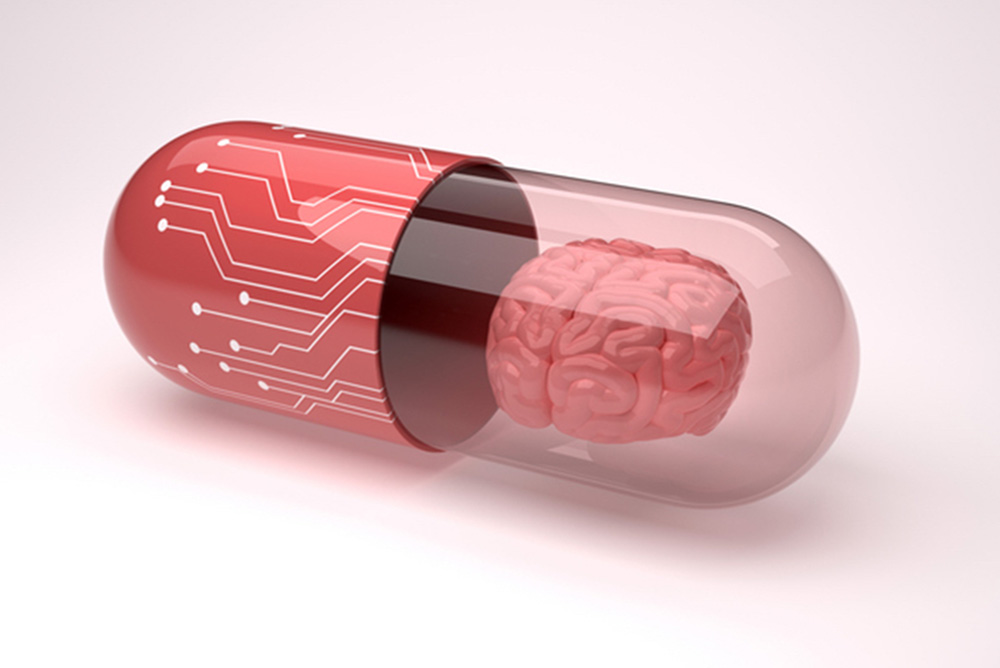
iStock
MODAFINIL, BIOHACKING, nootropics, racetams, eugeroics—if you haven’t heard these words, you might be missing the biggest news in brain boosters since Adderall came on the market in 2002.
Modafinil, a drug launched in the late 1990s to treat sleep disorders, such as excessive daytime somnolence, appears to have performance-enhancing effects comparable to those of Adderall. But, unlike other “smart drugs,” modafinil is not an amphetamine and, instead of stimulating all psychomotor activity, it specifically improves alertness with fewer side effects and lower potential for abuse or addiction.
In a 2008 survey by the journal Nature, one in five of its readers had taken brain-boosting drugs, and half of those had used modafinil, according to Scientific American MIND’s 2016 article “A Safe Drug to Boost Brainpower.”
The percentage of adults ages 26 to 34 taking all “ADHD medications”—modafinil, as well as Adderall, Ritalin and Concerta, when prescribed off-label as cognitive enhancers—almost doubled, from 1.5% to 2.8%, between 2008 and 2013.
Doctors prescribe modafinil (Provigil) for sleep dysfunction, although many also prescribe it off-label as a smart drug. And it can also be ordered from online pharmacies, albeit a potentially illegal and unreliable route —with pricey delivery fees and many weeks en route.
Modafinil is the best known of the eugeroics—from the Greek for “good” and “awaken,” applied to drugs that reduce the need for sleep—as distinguished from psychostimulants. And it’s considered a nootropic—from the Greek for “mind” and “to bend or turn”—along with caffeine, nicotine and the racetams (OTC stimulants). Some of these drugs, including modafinil, appear on the World Anti-Doping Agency’s list of prohibited substances and are banned by sports organizations for athletes without an ADHD diagnosis.
Biohacking involves using drugs—as well as non-pharmaceutical alternatives such as neurofeedback—to enhance cognitive function. Considered a “lifestyle drug,” modafinil is used by those coping with busy lives as well as flight crews and soldiers who must stay alert during long work hours. The film “Limitless” with Bradley Cooper is based on the effects of modafinil.
Among biohacks, modafinil stands out: it’s not a stimulant and so doesn’t risk causing jittery feelings or after-effects such as crash or withdrawal; and it can increase resistance to fatigue, improve mood and reduce “impulse response,” that is, making bad decisions.
On the other hand, it’s too early yet to know about long-term effectiveness or safety. And possible side effects include insomnia, headaches and stomach aches.
An analysis of 24 studies done between 1990 and 2014 to evaluate modafinil’s effect on cognition found that for simple tasks, those taking the drug experienced few benefits compared to those taking a placebo. But for participants doing more complex and difficult tasks, modafinil most often improved decision-making and planning, and some studies showed gains in flexible thinking, combining information, and coping with novelty, according to an Atlantic story,“The Rise of Work Doping,” which quotes Oxford University neuropsychologist Anna-Katharine Brem: “What emerged was that the longer and more complex the task…the more consistently modafinil showed cognitive benefits.”
Scientists aren’t yet sure how modafinil affects cognitive function. Among a range of possibilities, it stimulates the release of histamine —with the opposite effect of antihistamines like Benadryl, which can cause drowsiness. Also, it triggers the release of other neurotransmitters, such as adrenaline —which boosts energy, creating the fight-or-flight response—and increases dopamine and norepinephrine, both related to wakefulness and energy levels.
Taking modafinil has also increased the effectiveness of antidepressants for the one-third of depressed patients who are not helped by antidepressants alone, even in conjunction with psychological counselling.
As to concerns about its effects on brain health, there is some indication that modafinil works as an antioxidant to reduce free radicals that can damage the brain. On the other hand, research has found its effects on cognitive functions decreased among older participants.
For this group, the appeals of biohacking may be offset by both the risk of side effects—especially insomnia, which can increase with age—along with the challenges of getting an off-label prescription or dealing with the vagaries of online pharmacies.
—Mary Carpenter
Read more well-being posts here.

I don’t know whether to feel that this is good, or human engineering. “Limitless” was a cautionary tale.
See Washington Post story from today: https://www.washingtonpost.com/national/health-science/tweaking-brains-with-smart-drugs-to-get-ahead-in-silicon-valley/2017/06/09/5bc9c064-0b35-11e7-93dc-00f9bdd74ed1_story.html?utm_term=.d606712f7812. You’re right, “Limitless” was scary.